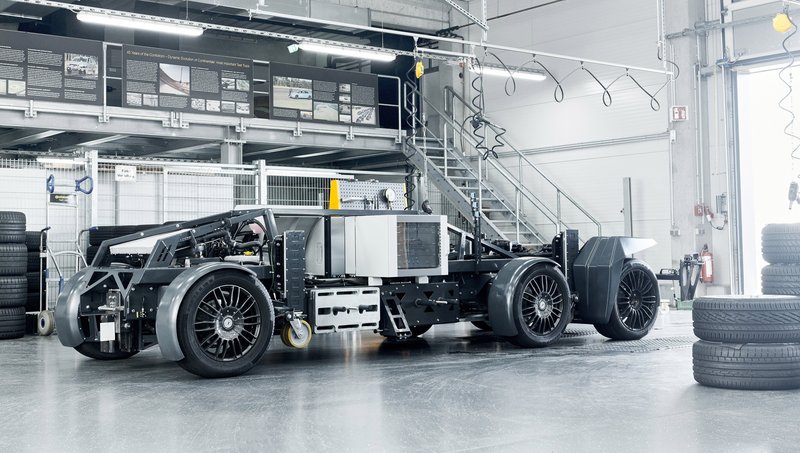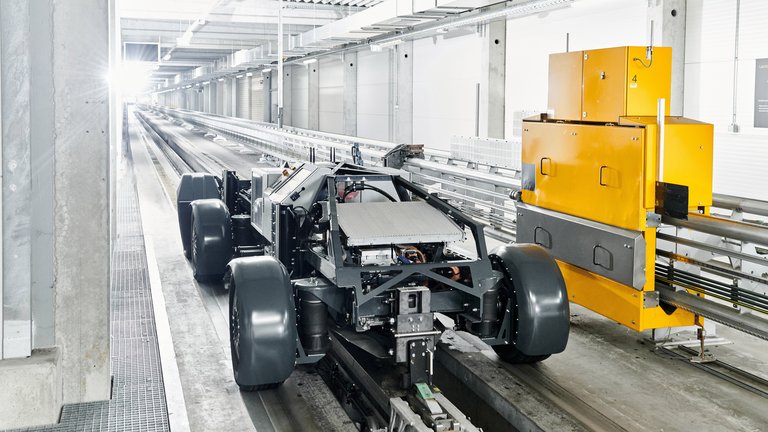Driverless, Fully Electric, Vehicle Model-Independent – Continental Re-defines Tire Braking Tests
- Fully electric and driverless test vehicle “AVA” enables high precision braking distance measurements on dry and wet roads
- Up to 100,000 tests per year in the 350 meter long, air-conditioned high-tech hall with exchangeable road surfaces
- Tire braking tests under fully controlled test conditions set new standards for tire development
Hanover, Germany, May 2, 2022. Continental has presented a driverless and fully electric test vehicle which it has developed for measuring the braking performance of passenger car tires. The objective of the fully automated test is to further reduce the braking distance of tires to ensure greater road safety. The AVA – “Analytic Vehicle AIBA” – enables precise monitoring of the frictional properties of tires during braking maneuvers on dry and wet roads. For the first time, the Continental AVA combines the advantages of a test method which is independent of the vehicle model, with the controlled and reproducible test environment of the Automated Indoor Braking Analyzer (AIBA). Continental’s tire testing experts can therefore perform tests regardless of vehicle specific characteristics. With this, Continental has one of the world’s most advanced and precise tire braking test methods. The cutting edge and globally unique test vehicle is used on the company’s proving ground Contidrom near Hanover, Germany.
“Our analytic vehicle AVA helps us to analyze the performance of our premium tires in even greater detail and systematically develop them,” explains Dr. Boris Mergell, Head of Research and Development of Continental’s Tires group sector. Transmission of forces between the tire and the road surface is decisive for tire braking performance. It is equally important for cornering characteristics or when changing direction. “The performance of the tire during braking is essential for the safety of the vehicle. For this reason, we make great efforts to analyze our tires as precisely as possible,” emphasizes Mergell.
For the tire braking tests, the AVA is accelerated to a test speed of 65 km/h with the aid of an electromagnetic linear drive, which is derived from modern roller coaster technology. Then, several fully automated braking tests are carried out. The AVA drive system is equipped with two electrically driven axles, which are powered by a high-performance battery. The high maximum torque ensures that a constant speed can be maintained, while the test tires on the third axle can be systematically braked. The integrated braking system of the AVA is equipped with Brake-by-Wire technology from Continental’s Automotive business sector. Unlike conventional hydraulic braking systems, the braking signal is transferred electronically. The brake response is very quick and precise, which is essential for accurate testing or measuring.
“Our AVA determines the transmission of forces between the tire and the road surface, while various slipping states, so-called “µ-slip curves”, are precisely reproducible. With the state-of-the-art measuring technology we measure all of the forces which act between the tire and the road surface during braking. We can compare our tires and their various compound compositions even more precisely and optimize them for their special uses,” explains Meletis Xigakis, who is responsible for global tire testing at Continental. The AVA is used in the Automated Indoor Braking Analyzer, which has started operation in 2012. Brake tests on various road surfaces are performed on the 75 meter test track. The air-conditioned area of the test hall has up to five road surfaces which can be exchanged hydraulically. In the weather-independent facility, up to 100,000 braking tests can be performed annually on dry, wet or even icy roads. The system is integrated into a 350 meter long and up to 30 meter wide hall.
In total, new Continental tire models are run for the equivalent of 25 million kilometers per year on test beds and test tracks. This corresponds to 625 times around the world. This great effort is fully justified. It is the basis of the premium quality of Continental tires. Together with the company test tracks in Uvalde, Texas (USA), and in Arvidsjaur, Sweden, the Contidrom in Jeversen, near Hannover, Germany, is one of the most modern proving grounds in the world. The test track near Hanover was opened in 1967 and since then has been continuously modernized to meet the increasing requirements on tire tests.
In 2013, the Contidrom was awarded the title “Proving Ground of the Year” by the international jury of the Automotive Testing Technology International Award. It is considered to be a benchmark by many customers in the automotive industry. On a total area of 160 hectares, the proving ground provides every conceivable option for tire testing. On a ten kilometer track with a large variety of partly water-covered road surfaces, and the legendary circuit with banked turns, speeds of more than 250 km/h are achieved. In addition, there are also tracks for testing chassis elements. During 2022, an innovative dynamic driving simulator which can calculate the exact dynamic parameters of the tires and the test vehicle involved will be commissioned at the Contidrom. This provides the professional Continental test drivers with exactly the same subjective driving feel as tire tests on the test track.

Henry Schniewind
Head of External Communications
Continental Tires





